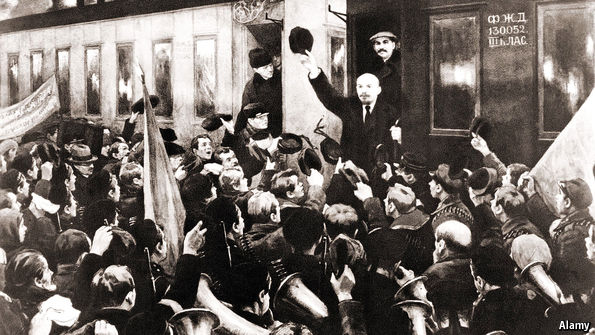
Lenin on the Train. By Catherine Merridale. Allen Lane; 353 pages; £25. To be published in America by Metropolitan in March.
A BRITISH intelligence officer dismissed Vladimir Lenin and his fellow revolutionaries as “fanatical and narrow-minded”. That was an understatement. But by early 1917 power in Russia was there for the taking. That February, 300 years of Romanov autocracy had been ended in a few dizzying days, while nothing had been put in its place. Russia, exhausted and desperate from three years of disastrous war with Germany and its allies, was being run by ineffectual and well-meaning moderates. Lenin knew exactly what he wanted, and he would deploy extraordinary energy and ruthlessness to achieve it.
But first he had to get there. The future Soviet leader had spent the war in Switzerland, marooned on a neutral island in a sea of belligerents. As the news broke of the upheaval at home, he became increasingly desperate. He even considered trying to reach Russia on a false passport, as a Swedish deaf mute. His ever-practical wife reminded him that this was bound to fail because of his habit of talking—in Russian, angrily, about politics—in his sleep.
Catherine Merridale is one of the foremost foreign historians of Russia, combining wry insights with deep sympathy for the human beings suffering the tragedies she writes about. She made her name in 2000 with “Night of Stone”, a book about victims of Soviet violence. In the first of what will be many offerings pegged to next year’s centenary of the Bolshevik revolution, she now tells the story of the world’s most fateful railway journey.
It combines diplomatic intrigue, spycraft, towering personalities, bureaucratic bungling, military history and ideology. Ms Merridale neatly unites background and foreground, and deftly evokes the atmosphere of the time, with references to John Buchan’s madcap wartime thriller, “Greenmantle”, whose plot neatly matches Lenin’s adventures. Details abound: Lenin’s sectarianism, for example, meant that he would not share the anti-war cause with others. He lambasted an anti-war article in The Economist—dismissing it caustically as “a journal which speaks for British millionaires”—on the ground that the authors wanted peace only because they were “afraid of revolution”. The central thread of the book is the journey itself, which took eight days and stretched over more than 2,000 miles (3,200km). Ms Merridale is no railway buff, which will be a relief to most readers if a disappointment to some. But she expertly pieces together the personal and the political.
A mischievous Estonian called Alexander Keskula was the first to suggest to Germany’s spy service that bringing Lenin home could serve a vital strategic goal. Strengthening the anti-war camp there would raise the chances that Russia would stop fighting, giving Germany time to beat Britain and France before America entered the war. Germany was soon convinced. The deal took just two weeks to negotiate: Lenin insisted that the train should be designated an extraterritorial entity. It was not to stop, and its passengers (a motley 32 in all) were not to be checked.
It was not a jolly journey. The Swiss authorities had confiscated their provisions on departure. The workaholic Lenin imposed strict Bolshevik discipline, including a sleep rota and two classes of tickets for the only lavatory. This was accompanied by much wrangling about the relative importance of smoking and using the toilet, which Ms Merridale primly terms “the two different types of physical imperative”. The trickiest part was crossing from Sweden to Russia. Ms Merridale unpicks the contradictory accounts of what happened on the border. Lenin and his party insisted that they were journalists heading home. A British spy, who had been posted to the crossing as a passport-control officer, tried gamely to delay them. But the authorities in Petrograd (soon to be Leningrad and now once again St Petersburg) believed that a democratic country should not ban its own citizens from entry. For that mistake, millions died.
Unfazed by the showy and unexpected reception that his Bolshevik colleagues had laid on for him at Petrograd’s Finland Station, Lenin jumped onto an armoured car and gave a fiery impromptu speech. The revolutionary message was hopeful and seductive: peace, bread, power to the masses and not to the plutocrats, radical redistribution of wealth, the transformation of social relations. It was achievable, as a less hungry and desperate people might have realised, only through extreme violence, including mass murder, colossal economic dislocation, the extinction of political freedoms and the eventual creation of a privileged, bureaucratic boss caste.
The most thought-provoking pages are on modern Russia’s undigested history. The political calendar celebrates both victims and perpetrators of communist terror. Everything is sacred but signifies nothing, such as Lenin’s embalmed corpse, still creepily lodged in its mausoleum in Red Square. Ms Merridale’s excellent book finishes with a reflection on the clock in the dictator’s Petrograd apartment (still reverently preserved as a museum): too precious to be moved, too costly to repair.